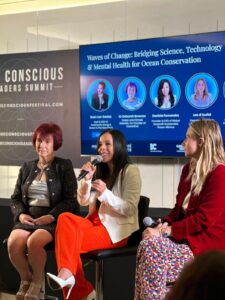
For many of us who work in social impact, September is our Super Bowl: Climate Week. Hosted in partnership with the UN General Assembly and the City of New York, this year’s event convened heads of state, business leaders, and several GSG clients who are leading in the sustainability and climate investing space.
This year’s theme was ‘It’s Time’, highlighting the fact that action on climate change is not moving fast enough.
Though investment in clean energy and net zero technologies is higher than ever, this year still started out as the warmest on record and broke records for multiple key climate indicators.
Climate Week serves as an important reminder that as social impact communications professionals, we play a critical role in inserting sustainability into the mainstream conversations of business, government, and the media.
In this month’s edition of The Goods, we discuss tools, tactics, and messaging that help communications professionals convey the urgency in calling for action on climate change and the most pressing sustainability issues of our time.
The Goods is a newsletter for social impact communicators that helps you keep track of the latest updates, trends, industry best practices, and much more. This content is compiled and curated monthly by Jade Floyd, Victoria Dellacava, and Mia Saponara.
Changing Minds on Climate Change
This year, GSG research found that while an overwhelming majority of voters see climate change as a major problem, 21% of voters still believe that it is either a minor problem or not a problem at all.
A growing body of social science seeks to address this small but meaningful swath of voters, identifying the best strategies to help people understand the stark reality that climate change is happening and that it is incumbent upon us to address.
Here is what the experts recommend we should incorporate into our communication on climate:
- Consensus messaging: Telling people that scientists almost unanimously agree that human-caused climate change is happening can help influence their thinking. A recent study published in Nature Human Behavior tested this type of messaging and found that the people least familiar with the findings or who were skeptical of climate science were the most likely to change their perspective when presented with consensus messaging.
- Personal relevance messaging: Scientists say it’s no longer enough to show a polar bear clinging to a melting ice sheet to illustrate the direness of climate change. Researchers find that having personal conversations helps: Instead of using the same old talking points, share personal stories. Climate change affects almost every aspect of your audience’s life—including food prices, national security, and local communities. Listen carefully and connect the dots between personal experiences that resonate with your audiences and climate information.
(Nature)
Joy as a Communications Strategy
Often, the media, politicians, and climate activists frame climate change as a dire crisis that will inevitably lead to the destruction of the planet.
Companies and organizations are trying a different approach: highlighting innovative climate solutions and new technologies with unlimited possibilities. Climate innovators are bursting with potential as human ingenuity, kindness, and cooperation are creating a joyful and abundant storytelling future.
The next time you’re writing your sustainability newsletter, your grassroots call to action, or your op-ed, consider framing your piece with joy and solutions, rather than fear. Analyze your audience’s response- it might lead to better engagement and higher open rates than you expect.
(Forbes)
Happenings From GSG
Sustainable Ocean Alliance at Climate Week

This week at Climate Week, Daniela Fernandez, co-founder and CEO of the Sustainable Ocean Alliance, and GSG client, hit the stages at NYC AgTech Week, Ocean Innovators Platform, The Conscious Leaders Summit, Worth Magazine: Techonomy Climate NYC, The Carbon Newbie Summit and the Transformative Impact Summit.
She shared innovative solutions that are accelerating the transition to a more sustainable and prosperous blue economy.
The Latest Data on Climate
Last month at the Democratic National Convention, GSG’s lead researchers presented our new report co-authored with Climate Power, EDF Action, LCV Victory Fund, and NRDC Action Fund, diving into overall attitudes on climate and clean energy. Our findings are clear: Climate is a winning issue for Democrats, especially with voters in swing states who will decide this year’s election.
Read our findings and get key information on the best messaging to use here.
Did we tell you something good? Share with a friend.